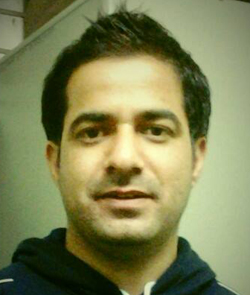The post 1990 literary landscape of Kashmir is dotted with the tales of trauma and torture after the dissent was muzzled and muffled in the 1989 rigged elections. The wanton killings, arson, arrests, disappearance and terror became the new phenomenons that define the post 1990 Kashmir. The recent back-to-back summers of unrest catalyzed the new phase of resistance and simultaneously enriched the literary canvass of the young English writers of Kashmir. The post 1990 events not only plunged the paradise of East into the perpetual embers of fire but changed the discourse as well as the language of literary narratives. Literature of any form is always conditioned by the society, circumstances and out of which it usually springs. In Kashmir the political uncertainty and the continuous cycle of bloodshed procreated and conditioned numerous writings in English fiction that delineate this human estrangement in their own way. Lullabies of pain and the sordid tales of oppression are the common themes in the literary enterprise of the post 1990 Kashmiri English fiction. Both native as well as the Kashmiri diaspora writers now no more see the colour red in roses; rather see blood soaked petals in the Mughal gardens of Srinagar.
Historically, if we see Kashmir has been always nestle to the poets, writers and artists because it provides the right serene environment for intellectual quest. From Lala Ded to Agha Shahid Ali, valley has produced great literary jewels that not only aestheticize and revolutionized the regional literature but brought it recognition and legitimacy on the international literary map. But in the shadow of violence, valley suffered inevitable catastrophe in terms of loss of life and economics.
However on the literary ground, there is a sudden surge of young Kashmiri English fiction/non-fiction writers appearing on the international literary radar canvassing the tragic and untold stories of loss. Every contemporary writer, either native or diaspora, is trying his best to paint the conflict and its multiple ramifications in such a way, so that the worldwide English readers can get accustomed to this forgotten conflict. This new English non-fiction literary trend started with a journalist turned writer Basharat Peer, who in his debut memoir Curfewed Night portrays the horrors of violence in Kashmir and the incessant agony and torment.
Peer’s work was followed by Mirza Waheed, a London-based Kashmiri journalist whose first novel, The Collaborator — is set in the backdrop of 1989 rigged election and talk about a frontier hamlet called Nowgam, situated on the bank of a roaring rivulet. Till 1989, Nowgam was an abode of peace and tranquility like any other part of Kashmir, but things changed dramatically, heaven within the heaven turned into garrisons, bunkers battlefields and the inhabitants are caged inside their houses.
His second novel, The Book of Golden Leaves, is a classic love story set again during the 90s in Kashmir. The plot of the novel revolves around a heartbreaking love story between Roohi, and Faiz, a Papier Maché artist, based in the downtown of Srinagar. The story gives an insight that how conflict affects the normal life, even the love affair that ends on a tragedy.
Then there is Siddhartha Gigoo’s The Garden of Solitude. The novel encompasses the painful migration of Kashmiri pundits and its agonizing aftermaths encountered by the community at the various migrant camps since the 1990.
Shafi Ahmad’s novel, The Half Widow, is a blend of historical fiction and the realistic events that occur around the main protagonists in the novel. The novel depicts the plight of the half-widows whose husband have disappeared and cannot be traced.
Shahnaz Bashir’s novel The Half Mother is a true woeful story of a mother and her epic search to find her only son. Bashir artistically flashes the main plots of Kashmir in the ‘90s and also unveils the inhumane rule, the arson and the torture. There are other Kashmiri English writers also like Nitasha Kaul, a London based Kashmiri novelist, her first novel Residue, is about Kashmiris who live far away from their homeland. The novel was shortlisted for the Man Asian Literary Prize (sometimes called the ‘Asian Booker’) in 2009. Noted essayist and novelists Pankaj Mishra wrote in The Guardian that “apart from the youth on the streets, there are also those with their noses in books…” his oracle appears to be true as the continuous saga of political oppression is actually yielding a rich intellectual and artistic harvest.
Well known independent documentarian Sanjay Kak’s anthology, Until my Freedom Has Come, in which the film-maker has compiled writing, mostly produced by Kashmir’s summer’s of uprising and the English translation of Prisoner No. 100, by Anjum Zamarud Habib’s clearly manifests that the subaltern and marginalized are writing back.
The new emerging English fiction in Kashmir is somehow managing to break the long solitude and mind forged manacles to be the voice of people who remained voiceless for a long time. The contemporary English writers in Kashmir and outside are not only chronicling the epic battle of fact and fiction but it shows their moral courage and intellectual integrity par excellence. These new writings employ subjective elements to present Kashmir as a conflict involving all the factors that have made life hard to live and endure. The way English fiction is emerging from Kashmir from the last couple of years and how within the short period of time it achieved the literary legitimacy and recognition worldwide is promising and productive. But it is good to sensationalize and to romanticize the vicissitudes of conflict for the literary purpose but given the distorted past and turbulent history of valley, every English fiction writer has a moral duty to wield his/her pen with a sense of responsibility. Kashmir also has a rich history, language and culture that now demands recognition.
The author is Resistance Literature Scholar at Pune University and can be reached at [email protected]















